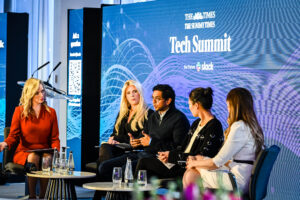After two years of enormous upheaval, many could be forgiven for craving a more stable and open 2022.
But, in its 2022 Media Trends report, media agency Dentsu International imagines a year shaped by 10 key happenings.
Together, they paint a picture of a digital media economy replete with flexible opportunity, despite a backdrop of real-world restriction.
The 40-page report is a first-time insight collaboration between Dentsu’s constituent Carat, Dentsu X and iProspect. We are summarising it here.
Collectively with all of our global #mediaagencies, we’ve identified & explored insights & predictions of the biggest #mediatrends to watch out for in 2022.
You can find them in the ultimate "#2022MediaTrends" guide, for #marketers worldwide here: https://t.co/lvubzp5k5T! pic.twitter.com/EeMCUfq4c4— dentsu uk&ire (@dentsuUK) November 17, 2021
1. The prolonged pandemic
It may be tempting to hope for a return to “normality” but, with consumer behavioural change now habituated, Dentsu warns: “The world will not simply rewind to 2019.”
1. Omnichannel everything
With many retailers now successfully blending online and in-store shopping, dentsu says: “We now see many other areas of life becoming omnichannel, developing hybrid models that mix digital and in-person participation.”
For evidence, see movie studios that are mixing at-home and theatrical releases, for example. Dentsu says brands should be live to the possibility to serve new customers keen on new channels.
2. New ways to buy
Shopping is getting embedded in everything. New categories of on-demand retailer offering products from third parties are rising, while social commerce and shoppable smart TV ads are putting “buy” buttons in ever more eyeballs.
Dentsu thinks advertisers should target these new contexts, rather than page categories.
3. Virtual worlds
You don’t have to don a headset to play in virtual space. Environments like Roblox and Minecraft have lit the touch paper under the virtual social opportunity.
VR’s long-running failure to make it big has become a cliche, but now growth signs - like adoption of VR fitness apps and wireless headsets - are real, with new-launch experiences from Meta and others standing the best chance of popularising the technology.
So, what is the #metaverse and how can we watch this #virtual space?
Hear from Alex Hamilton, Head of Innovation at our very own @Isobar_UK, on the metaverse and the opportunities it poses for #brands in 2022 and beyond.https://t.co/XqLsrjzBXI pic.twitter.com/HZg7d3ctmO
— dentsu uk&ire (@dentsuUK) December 10, 2021
4. Secure scarcity
A key Web 3 trend, NFTs and blockchain are reckoned to be ushering a new re-valuing of content and digital artefacts, challenging the idea that “information wants to be free”.
Of course, value is derived partly from scarcity. Dentsu advises brands to “start small, test, and scale” by “identify(ing) the superfans willing to pay for items or experiences connected to the brand”.
5. Fans of flexibility
Flexible and at-home working has been firmly established as desirable for swathes of people. Suddenly, when it comes to the Victorian practice of the 9-to-5, all bets are off.
Dentsu imagines companies employing people based on time zones, with in-office workers commanding a salary premium.
2. Brand citizenship
Soulless corporate culture doesn’t cut it any longer. Shaken by COVID-19, Black Lives Matter and the climate crisis, “brands are increasingly showing their human side”, searching for their purpose, Dentsu says.
6. The responsible rebuild
The pandemic offers an opportunity to reset a culture that, for many, was always destructive. Dentsu’s report sees more companies pushing toward carbon-neutral or -negative, with others making concerted efforts to fit within the circular economy.
It stresses the importance of brands articulating core values in this regard, and aligning with consumers’ own beliefs.
7. Sustainable marketing
In 2022, sustainability for brands is not just about warm words. More of them are beginning to put their money where their mouths are.
Dentsu says they should “ensure that budgets also support sustainable values“ and “move budgets into more sustainable channels, using market power to help new technologies and BAME-owned media to grow”.
3. Identity
With digital ad targeting techniques in flux and digital identity validation a key talking point, identity has rarely been more in the spotlight.
8. The end of anonymity
2022 may be the year of authentication. Growing online safety concerns, plus verification from online services as diverse as dating and NFTs, set out to prove an individual is a valid holder of a given item. To gain real-name opt-in and authentication compliance, brands will need to build a relationship on trust.
9. Beyond the cookie
Buoyed by global privacy legislation, cookies, the traditional key means of digital ad targeting, are being removed by software vendors, leaving the ad industry scurrying for alternatives. Solutions lay in contextual targeting, identity-based solutions and other options that advertisers must investigate, Dentsu says.
10. Value exchanges
In lieu of cookies, in 2022, if you want to gain a consumer’s consented user profile, you will need to provide a value exchange. Dentsu says brands are getting creative at standing-up engaging mini-experience sites and apps designed to solicit user data.
The agency says brands must “create compelling tools and content, support them with relevant channels including paid media, social posts and PR”, and "build in repeat use and loyalty elements to ensure that permissions given don’t expire".
How can #brands succeed in a crowded #marketplace?
With Samantha De Caprio, Managing Director at our Dentsu Data Labs, we unpack the key #trend for brands of Value Exchanges in our Dentsu Media Trends 2022 #report as we move into a #cookieless future.https://t.co/k7lNI9ckM2 pic.twitter.com/rFjaglRmP8
— dentsu uk&ire (@dentsuUK) December 9, 2021









